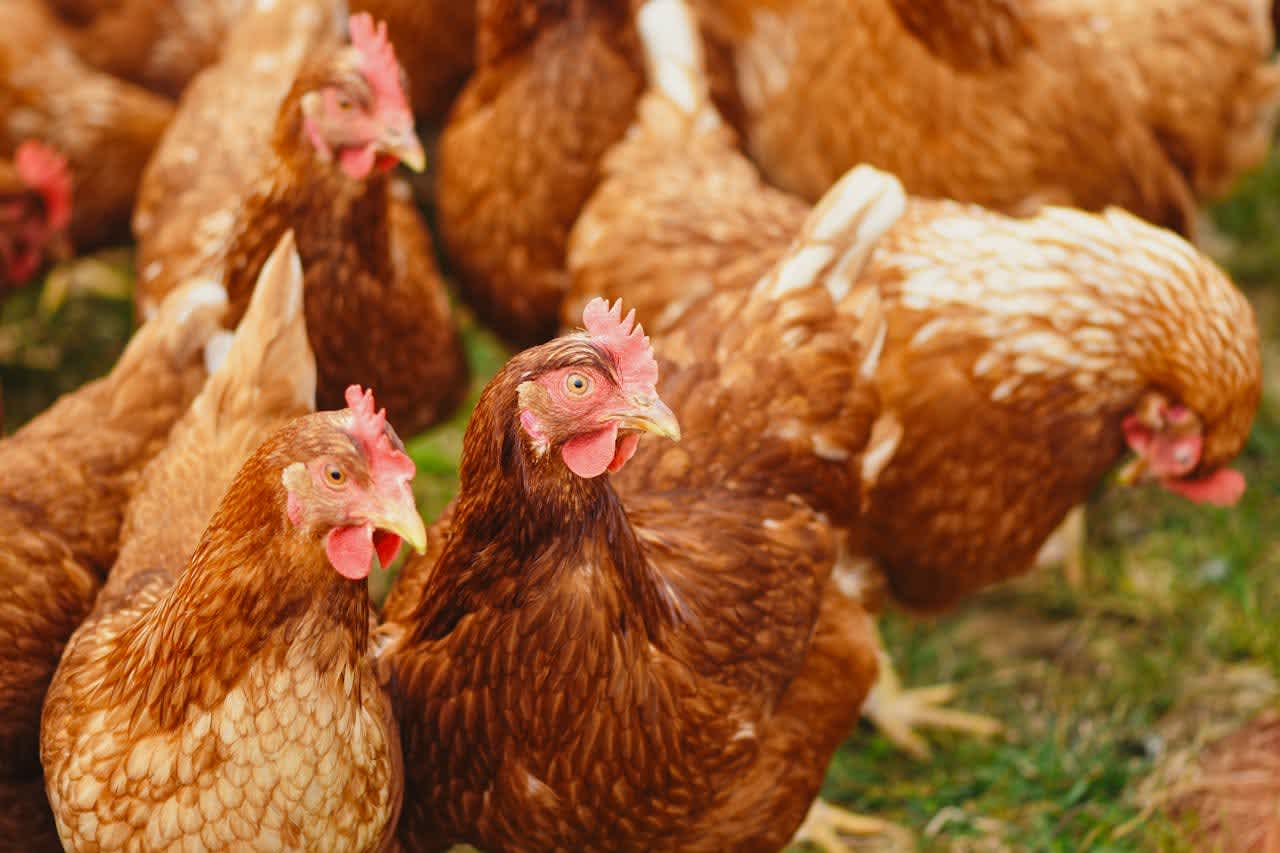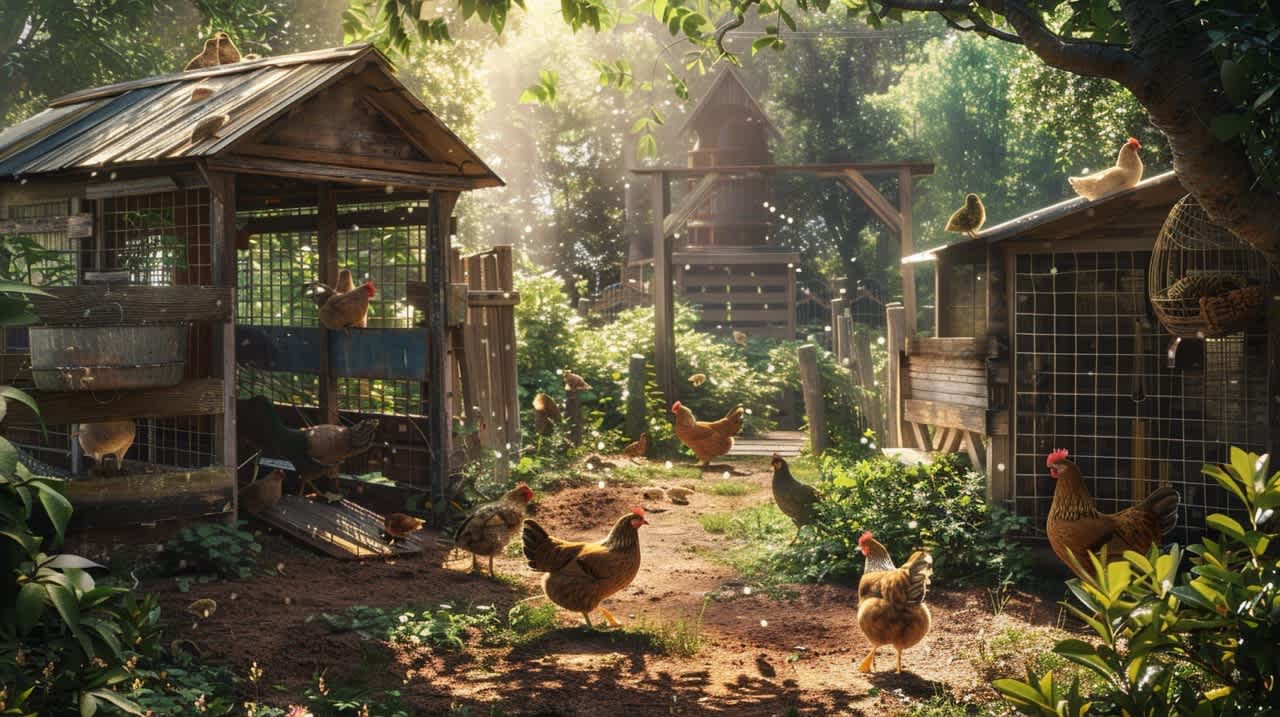ISA Brown Chickens: The Complete Breed Profile, Care Guide & More
Published: July 12, 2024

In this article we talk about Raising ISA Brown chickens.
You'll want to start by understanding their specific housing needs to ensure they have a comfortable and secure space. Proper nutrition helps keep them healthy and productive, while regular health checks can prevent common issues.
Don't overlook their social behavior—these chickens thrive on interaction. Seasonal care adjustments are essential as well.
How can you effectively manage these aspects to ensure a thriving flock and consistent egg production? Let's explore this step by step.
Origin and Breed History
With origins dating back to 1978 in America, the ISA Brown chicken was developed by Institut de Sélection Animale primarily for its exceptional egg-laying capabilities.
Here's what you need to know about the origin and breed history of the ISA Brown:
Breed Development: The ISA Brown was carefully bred as a hybrid to excel in egg production, making it a popular choice for backyard flocks.
Hybrid Nature: Due to their hybrid nature and recent development, ISA Browns aren't considered heritage breeds, but they're prized for their prolific egg-laying abilities.
Popularity: These chickens are widely favored for their abundant egg production and are commonly kept in backyard settings for their reliability.
How Long do ISA Brown Chickens Live?
A common question among farmers.
These chickens typically live 2–3 years, although with excellent care, some can reach 5-8 years. High egg production in ISA Browns can lead to reproductive exhaustion, potentially shortening their lifespan.
Monitoring their nutritional needs, including providing vitamins and oyster shells, support their health. Ensuring proper calcium intake is vital to prevent health complications and extend their lifespan.
Reproductive health is another key aspect to consider. Regular health checks are necessary to detect any issues early on. Consulting a veterinarian for specific concerns can help maintain the health of your ISA Brown.
Understanding the background and characteristics of the ISA Brown can help you provide the best care for these productive chickens.
Physical Characteristics
ISA Browns boast feather coloration ranging from shades of red/brown like Chestnut, Honey, to Red, coupled with a single bright red comb and medium bright red wattles.
ISA Browns are adaptable but require shade in hot weather to prevent overheating. Roosted runs with access to cooler areas can assist them in regulating their body temperature effectively.
Additionally, parasite prevention is essential for these chickens. Regular monitoring and appropriate preventive measures can help keep parasites at bay and ensure your chicken's well-being.
Housing Requirements
To ensure your ISA Brown chickens thrive, you'll need to provide them with a secure, spacious chicken coop that will allow for free range movement.
A well-thought-out coop design is helpful for their health and well-being. Start by making sure the coop is large enough to accommodate all your chickens comfortably. Each chicken should have at least 4 square feet of space inside the coop. This space helps prevent overcrowding and reduces stress among your flock.
When it comes to bedding, opt for materials like straw, wood shavings, or shredded paper. These materials not only provide a soft surface for your chickens to rest on but also help absorb moisture and control odors. Regularly change the bedding to maintain a clean environment and reduce the risk of diseases.
Predator protection is another essential aspect of housing your ISA Brown chickens. Ensure the coop is sturdy and has no gaps or holes that predators could exploit. Using hardware cloth instead of chicken wire can offer better security, as chicken wire can be easily breached by determined predators.
Also, consider installing a secure latch on the coop door and using an apron of wire mesh around the base to deter digging predators.

Ventilation is key to keeping your chickens healthy. Proper airflow helps reduce moisture and ammonia buildup, which can cause respiratory issues.
Install vents near the roof of the coop and windows that can be opened and closed as needed. This setup ensures fresh air circulates while keeping drafts at a minimum.
Feeding and Nutrition
Ensuring your ISA Brown chickens receive a balanced diet is ideal for their overall health and egg production. These chickens have specific dietary requirements that must be met to keep them thriving. Understanding their feeding habits will help you provide the best nutrition possible.
ISA Browns, like other hybrid breeds such as Rhode Island Reds, are known for their high egg production, so they need a diet rich in proteins, vitamins, and minerals. A good-quality layer feed should form the basis of their diet. This feed is specially formulated to meet the dietary requirements of laying hens, providing them with essential nutrients. Make sure to choose a feed that has at least 16-18% protein content to support their high energy needs.
In addition to their main feed, consider incorporating nutritional supplements into their diet. Calcium supplements, like crushed oyster shells or limestone, are vital for strong eggshells. You can also provide grit, which helps them digest food more effectively. Fresh greens, vegetables, and fruits can be offered as treats, but these shouldn't replace their primary feed.
Establishing a consistent feeding schedule is important. Feed your ISA Browns twice a day, once in the morning and once in the late afternoon. Ensure they've constant access to clean, fresh water, as dehydration can negatively impact their health and egg production.
Be mindful of their feeding habits. Monitor their food intake and adjust portions as needed to prevent overeating or underfeeding.
A balanced diet, regular feeding schedule, and appropriate supplements will keep your ISA Brown chickens healthy and productive. By paying close attention to their nutrition, you'll ensure they remain happy, healthy, and productive layers.
Health and Wellness
Maintaining the health and wellness of your ISA Brown chickens involves more than just proper nutrition; it requires regular monitoring and preventive care practices.
You'll need to keep a close eye on your flock to spot any signs of illness early. Look out for symptoms like lethargy, abnormal droppings, or changes in appetite, as this could indicate potential health problems. By catching issues early, you can often prevent them from becoming serious problems.
Preventative measures are essential in keeping your chickens healthy. Regularly check your chickens for parasites such as mites and lice, which can cause discomfort and lead to more severe health issues. Dust baths with diatomaceous earth can help control these pests.
Additionally, make sure your chickens receive timely vaccinations and deworming treatments as recommended by your veterinarian. Establishing a relationship with a local vet experienced in poultry care ensures you have professional support when needed.
Exercise and mental stimulation support the well-being of your ISA Browns. Provide them with plenty of space to roam and forage. This not only helps them stay physically fit but also keeps their minds active. You can create an engaging environment by adding perches, dust bathing areas, and objects for them to explore.
Chickens are naturally curious and will benefit from a stimulating environment where they can peck, scratch, and investigate.
Lastly, maintain a clean living area for your chickens. Regularly clean their coop, change bedding, and ensure they've access to fresh water. A clean environment reduces the risk of disease and promotes overall health.
Egg Production
ISA Brown chickens are renowned for their exceptional egg-laying capabilities, producing large brown eggs, making them a popular choice for backyard chicken keepers and small farms. These hens can produce an impressive 300 to 350 eggs per year, often laying consistently even through the winter months when other breeds slow down.
To ensure high egg quality, you'll want to provide a balanced diet rich in calcium and protein. Eggshells are primarily made of calcium, so supplementing with crushed oyster shells or a commercial layer feed can help maintain strong, healthy shells. As mentioned, clean, fresh water should always be available, as dehydration can negatively impact egg production.
When it comes to breeding tips, it's essential to know that ISA Browns are hybrid chickens. This means they're bred from carefully selected parent stock to optimize their laying abilities.
If you're considering breeding your own, remember that the offspring may not have the same prolific egg-laying traits. For those intent on breeding, it's often more reliable to purchase new ISA Brown pullets (young hens) from reputable breeders to ensure consistent, high-quality egg production.
Social Behavior
In addition to their impressive egg-laying abilities, ISA Brown chickens exhibit friendly and social behavior that makes them a joy to keep. They're known for their calm and curious nature, which helps them seamlessly fit into various flock dynamics. Understanding these dynamics helps maintain a harmonious flock.
ISA Browns are low maintenance and adept at communication, using a range of vocalizations and body language to interact with each other and with you. One interesting aspect of their social behavior is the establishment of a pecking order. This hierarchy determines the social standing of each chicken in the flock, influencing access to food, nesting sites, and roosting spots.
ISA Browns generally integrate well with other breeds, but it's essential to monitor new introductions closely to ensure a smooth transition. Flock integration should be gradual, allowing time for the chickens to establish relationships without excessive aggression.
To foster positive flock dynamics, provide ample space, multiple feeders, and waterers to minimize competition.
Regularly observe your chickens to identify any signs of bullying or stress, which can disrupt the harmony of the group. Communication among flock members is continuous and complex, involving clucking, squawking, and even subtle physical gestures.
Seasonal Care
As seasons change, you'll need to adjust your care routine to ensure your ISA Brown chickens stay healthy and comfortable year-round. Each season brings unique challenges and opportunities for your flock, so understanding what they need is important.
During winter preparation, ensure your chickens have a warm, draft-free coop with access to clean water that doesn’t freeze. Insulate the coop and use a safe heating source if necessary. Keep water from freezing by using heated waterers. Chickens consume more food in winter to generate body heat, so provide extra feed.
Summer heat can be stressful for your ISA Browns. Provide plenty of fresh water and shade to prevent overheating, especially when the chickens are just a few weeks of age. Consider using fans or misters in the coop to keep the temperature down. Ensure the coop is well-ventilated to avoid heat buildup. Offering frozen treats like watermelon can also help your chickens stay cool and hydrated.
In spring, ISA Browns often go through a molting phase, where they shed old feathers and grow new ones. This process requires extra protein, so adjust their diet accordingly. You might notice a temporary drop in egg production during this time, which is normal. Ensure they've a clean, calm environment to reduce stress.
Fall egg production tends to increase as temperatures cool and daylight hours decrease. To support this boost, provide a balanced diet rich in calcium and protein. Maintain clean nesting boxes to encourage laying and prevent disease. As days get shorter, consider using supplemental lighting to extend daylight hours, ensuring consistent egg production.

Common Challenges
Caring for ISA Brown chickens isn't without its challenges, and understanding common issues can help you keep your flock healthy and productive. Here are some common challenges you might face:
Predators: From hawks to raccoons, predators are always a threat to your chickens. Ensuring your coop is secure with sturdy fencing and covered runs can help protect your flock. Additionally, consider using motion-activated lights or alarms to deter nocturnal predators.
Weather: Unlike some heritage breeds, ISA Brown chickens are generally hardy but can be sensitive to extreme weather conditions. In hot climates, provide plenty of shade and fresh water to prevent heat stress. During cold winters, ensure their coop is well-insulated and draft-free. Adding a heat lamp can help, but be cautious to avoid fire hazards.
Mating Behavior: While ISA Browns are typically calm, their mating behavior can sometimes cause stress within the flock. Roosters can be aggressive during mating season, leading to injuries among hens. Monitoring the flock and separating overly aggressive roosters can help maintain peace.
Egg Laying: ISA Browns are prolific layers, but they can face issues like egg binding or reduced egg production. Ensuring they've a balanced diet rich in calcium can help maintain healthy egg production, resulting in high number of eggs compared to pure breed chickens. Additionally, regular health checks can catch early signs of problems like egg binding, where an egg gets stuck inside the hen, which is a good idea for maintaining optimum egg production.
Taking Care of the Breed
We hope you found useful tips in this ISA Brown care guide.
With a little love, attention, and the right knowledge, you'll be on your way to having a flock of happy, healthy, and egg-citing chickens in no time.
Your dedication to their well-being will be rewarded with happy hens and plenty of high-quality eggs.
Keep track of all your cattle with the #1 Cattle Management Software
Try out Ranchr today for free